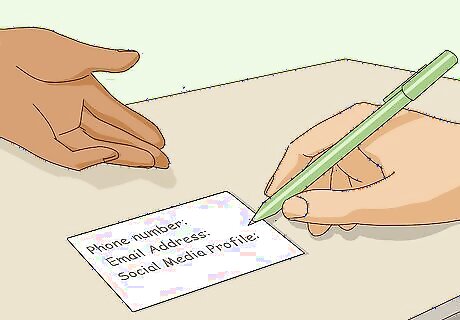
views
Meeting New People

Identify quality friends. An ideal friend will share your values, interests, and beliefs. Quality friendship is based on a mutual understanding of the qualities you share, and acceptance of your differences. When you look for a friend, try to find someone who will: Be genuinely interested in you and your life. They will take the time to listen to what you have to say, and respect your thoughts and feelings. Accept you fully, including any differences in opinions. Listen to you without judging you or pressuring you to change your personal opinion and beliefs. Comfortably share their thoughts, feelings, and emotions with you. Keep in mind, though, that you should also feel comfortable being open and sharing things about yourself.

Reach out to people you see every day. Expect strong friendships to rely on consistent interaction. Focus on people that you already see on a regular basis. Odds are that you'll either work and/or go to school with most people who fall into this category, but don't limit yourself to that. Consider anyone whom you see on a regular basis. This could be anyone from a fellow passenger on the train who shares the same commute each day to another dog owner who walks their pup in the park at the same time as you. Pausing to chat with people like these can result in a stronger relationship than the one you have with your BFF from high school if you don't speak with the latter very often.

Go to parties. Accept any and all invitations that other people extend. Remember: the whole point of a party is to relax, let your hair down, and socialize, so this is the perfect place to strike up conversations with people you hardly know because everyone's expecting it. Whenever you're given the chance to attend a party, jump at it! Do so even if the person inviting you isn't exactly the friend you're looking for. You may end up meeting someone more desirable through them.

Strike up conversations with people who share your interests. People love talking about things they love, so use that to your advantage. Whenever you see someone engaging in something that you're passionate about, engage them! Break the ice with a topic that you could both go on and on about. Try something as simple as: Mentioning that a certain book is a great read if you see someone reading it or pulling it off a shelf at the library or bookstore. Commenting on how much you love a band if you see someone sporting a t-shirt or anything else with their name or images. Complimenting someone's pet if it's an animal that you love.

Hit the "scene." Go to coffee shops, concerts, shows, or anywhere else the kind of people that you hope to meet tend to gather to relax or be entertained. If you're of age, go to bars and clubs. In order to meet people, you need to go where they go, so put yourself out there. Go wherever the scene is, whether it's: The park The beach A music scene Sports events

Go to organized events. If the idea of just walking into a bar or coffee shop on any random night and striking up a conversation with perfect strangers is a little intimidating, then go to some kind of event that's open to the public instead. Choose one that appeals to your interests and use the subject at hand as an ice-breaker. For instance, you could go to: Trivia nights Wine-tastings Singles events Professional conferences Walking tours Yoga classes Running clubs

Join some kind of organized group. People tend to have a tribal mindset, so use that to your advantage. Expect forming friendships to be much easier if you're both part of a unifying group. Join any kind of organization that appeals to you. Then use your membership and shared interests to form an instant bond with fellow members. Consider things like: Church or volunteer groups Gym classes, sports team, or similar clubs Book clubs, art classes and other cerebral pursuits

Branch out through your existing friends. Don't feel like an organized group of people needs to be an official club. Treat other people's circle of friends as an organized group in and of themselves. When you befriend one person, use that friendship as a common bond to build on with their other friends so you can form a more direct relationship with each of them, too. Meeting new friends through existing ones makes it much easier to maintain the new relationships that you build, because everyone's already connected. This doesn't mean you have to turn down friendships with a dozen different people just because you meet each one separately. Just expect a lot more work in keeping those friendships alive.
Meet people online, too. Expect friendships to require consistent interaction in order to survive, but don't take that to mean that it needs to be face-to-face. Utilize the internet. Join online forums and communities that share your interests. Start conversations with other users just like you would in a “real world” setting.
Making Yourself More Available

Turn solitary pursuits into social ones. Obviously, a great way to break the ice with new people is having a common interest, but not all interests lend themselves immediately to a group setting. If most or all of your hobbies and passion projects tend to be one-person endeavors, think of ways to repurpose them to include other people. For example: If you love writing, join a workshop where you and other members share your respective work and discuss them. If you're a runner, find clubs in your area that practice and run races together. If you do a lot of DIY projects around the house, attend seminars on home improvement.

Ask for contact info. Whenever you have a positive exchange with someone new, follow it up by asking for their contact information. Demonstrate that you've enjoyed your time together by showing that you want to repeat it. If they're willing to, be sure to provide them with your own so they can get in touch with you, too. You don't need every possible way to reach them, so just ask for one at first, like their: Phone number Email address Social media profile

Break your routine when necessary. Everyone has their own routine in life, but don't let yours hold you back. Understand that making new friends requires you to make room in your life to accommodate them. Be willing to readjust your schedule to make time for them. For example, you may enjoy winding down after school or work by watching TV at home. But, assuming you have work or class five days a week, sticking to this pattern without fail will really limit your availability. This doesn't mean you have to go out clubbing straight from work or school each night. But at the very least be willing to vary your routine by inviting people over or chatting with them online or over the phone.

Avoid the “Mr. or Miss Right” mindset. As with romantic relationships, don't limit yourself by holding prospective new friends up to an overly idealized standard. Sure, you may have a preconceived idea of what your “perfect” friend would be like, but refrain from comparing real people to that. Leave yourself open to surprises. For instance: Let's say you joined a running club and have started buddying up with a fellow runner. As you get to know them, you realize that they come from a much different background than yours and lead a much different lifestyle. Although you may have hoped to meet someone much like yourself, with the same interests and personal tastes, that doesn't mean this person won't be a great friend. They may in fact open the door to new experiences that you otherwise would never have had.

Show vulnerability. People are attracted to self-confidence, but don't confuse self-confidence with trying to come off as absolutely perfect 24/7. Expect new friends to feel a deeper bond with you if you give them the opportunity to provide advice, comfort, and emotional support. So don't be afraid of sharing uncertainties and fears with new people. This could be done through simple means like conversation, or you can incorporate it into your decision about what type of groups or activities you want to join in order to meet new people. For example, join a drama club if you're nervous about public speaking, or up the ante even further and try something like skydiving.
Strengthening Your Relationships

Meet up with your new friends outside of established settings. Think of your friends from school for a second. Odds are, you probably hung out with your closest pals during school breaks and fell out of touch with those you only ever saw in the classroom. However you might meet your new friends, don't let those initial circumstances define your relationship. Extend your relationship outside of the proverbial classroom. For example: If you've become pals through a mutual friend, don't allow yourself to become dependent on that mutual friend. Suggest some one-on-one time without them instead. If you've met new friends through, say, an art class, find other activities that you can all participate in before that course ends, whether it's joining a new class or just meeting up for coffee.

Follow through with the plans you make. Planning to meet up for coffee or drinks or a movie is all well and good, but expect to lose favor with people if you constantly break plans with them. Whatever your plans might be, see them through. Prove yourself to be reliable so they don't start thinking of you as a flake who isn't worth their time. Obviously, stuff happens, and sometimes you do need to break plans. That makes it all the more important to follow through whenever you can, even if you don't find yourself in the mood for coffee or drinks when the time comes.

Say “yes” to invitations. Accept their offers to meet up and hang out whenever possible. This doesn't mean you have to go out partying the night before a big test or meeting just to please your new buddy, but remember: strong friendships need regular contact. Show them that you want to remain friends by seizing each chance they give you to spend time together. Keep in mind that they'll probably stop giving you the chance if you keep turning them down. So if there's a specific reason why you have to keep saying “no,” let them know what it is. Offer alternatives so they know they still matter to you. For instance, if they keep asking you to go out dancing on Thursday night when you have to wake up early every Friday, explain the situation. Then suggest another time to meet up, or maybe a more laidback activity for Thursday night if that's the only time they can meet.

Match each attempt they make to reach out to you. Don't make the other person feel like they're the only one making an effort to stay in touch. Take on an equal amount of responsibility in keeping your friendship active. Whether they've set up some fun activity to do together or just reached out to you with a phone call or email, return the favor and do the same with the same frequency. One exception would be if they happen to be shy or otherwise reserved. In that case, matching their level would obviously spell doom. If they're not the type to reach out themselves, it will probably be on you to keep in touch.

Be attentive to others. When you hang out with friends or meet new people, be sure to focus on them rather than expecting them focus only on you. You'll be able to better connect with others and develop more meaningful friendships when you show interest in other people. When you are fully engaged in what they are saying, how they are feeling and thinking, it shows. Be genuine. Don't pretend to listen as others can pick up on that quickly, and may find it insincere or off-putting.

Avoid acting a “part.” Meeting new people and trying new things often means stepping outside of your comfort zone, but as you do, be careful to stay true to yourself. Avoid the temptation to act like someone you're not just to impress someone. Although doing so might seem to work at first, expect it to grow tougher the longer you try to keep it up. If you feel like playing a part is necessary to maintain your friendship, then the truth is that you're probably better off being friends with someone else.


















Comments
0 comment